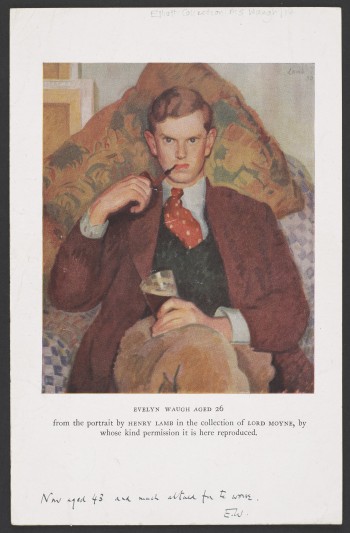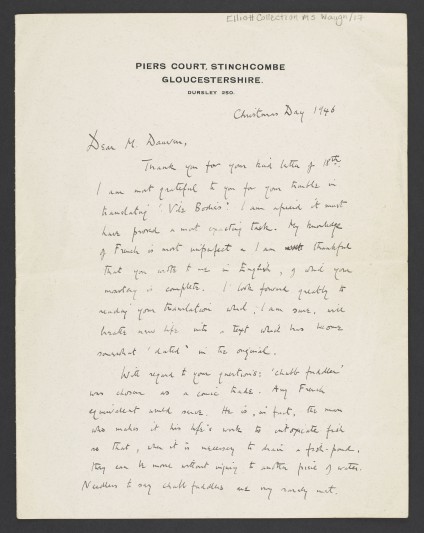The letter concerns Duveen's translation of Vile Bodies and contains a potted autobiography of his life as well as an inscribed portrait after Henry Lamb. Les Editions de la Table Ronde, the Parisian publishing house founded by Roland Laudenbach, offered to publish a translation of Waugh’s second novel, Vile Bodies (1930). In the letter he offers explanations of unfamiliar English expressions in the text of the novel, explaining what a “chubb fuddler” is and that kedgeree is “an excellent luncheon or breakfast consisting of rice, eggs & salmon or haddock”.
Waugh hopes that the translation “will breathe new life into a text which has become somewhat dated in the original”, but he “cannot help thinking in a book so localized and slangy there must have been other unfamiliar expressions.” He gives details of his life, including his education, his travels, religion and family life. Reflecting on his service during the war he writes “I did a parachute course and joined my old friend Randolph Churchill (Winstons’s son) in Jugo-Slavia and finished the war among Tito’s beastly partisans.” He shares that he wrote Brideshead Revisited whilst recovering from a broken leg (caused by parachuting): “This book is more serious than its predecessors, has annoyed most of the English critics and delighted illiterate Americas in a disconcerting way. But I like it.”
After Waugh’s death (1966), his widow sold Waugh’s collection of his own manuscripts and his library to the University of Texas. Good material remained outside Waugh’s possession and outstanding items were acquired by Fay and Geoffrey Elliott. They desired that the items should be accessible in England and presented them to Leeds in 2002 as part of the gift of their literary collection (1890-1950). Significantly, this included the autograph manuscript of Vile Bodies and a number of items of juvenilia. It is the only manuscript of a novel by Waugh outside Texas. It was fitting to acquire a letter that could draw new light on the manuscript and the life of the man.
The manuscript of Vile Bodies is displayed in the Treasures of the Brotherton Gallery at the University of Leeds. The letter and image of Waugh provide a new depth to the display. The letter has been publicised and used in social media for the Galleries. The autobiographical nature of the content enhances the narrative around our collection of juvenilia. Waugh’s own reflection on translation gives new weight to the use of Vile Bodies in archive-based teaching at the University. We have worked with academics and the Evelyn Waugh society to promote research and use of the collection and we hope for further collaboration with researchers.

